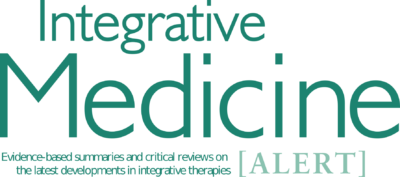
Integrative Medicine Alert – February 1, 2009
February 1, 2009
View Issues
-
Glucosamine Sulfate for Osteoarthritis
Osteoarthritis is the most common form of arthritis and a leading cause of disability in the United States. -
De-SELECT? Vitamin E, Selenium, and Prostate Cancer
Results of the SELECT trial, a large randomized, placebo-controlled, double-blind trial designed to help determine whether selenium, vitamin E, or both could safely prevent prostate cancer in middle-aged and older men, were not to be published for another four years. Interim analyses, however, revealed no benefit from therapy, and even some potential health concerns. -
Carnitine Shows Promise Against Risk Factor for Cardiovascular Disease
Carnitine supplementation produced beneficial changes in endothelial function as measured by flow-mediated dilation (FMD) after a high-fat meal. No significant differences were found for other biomarkers of inflammation and oxidative stress. -
Old and New Treatments for Irritable Bowel Syndrome: Effective or Not?
This article was a systematic review and meta-analysis of high-quality randomized controlled trials determining the effect of fiber, antispasmodics, and peppermint oil in the treatment of irritable bowel syndrome, and demonstrating superiority of the three examined therapeutic modalities as compared to placebo. -
Statins, Sterols, and Stanols
Margarines containing plant sterols and stanols can be an effective long-term therapeutic intervention to aid with cholesterol lowering in people already on a stable statin regimen. -
What's That Herb Again ... ? Ginkgo for Dementia
A well-regarded, standardized extract of Ginkgo biloba does not appear to help prevent development of dementia in seniors with baseline normal or mildly impaired cognitive function. Whether use of ginkgo earlier in life has a primary preventive effect on development of dementia remains to be determined. -
News Briefs: Overall Use of CAM by U.S. Adults Remains Steady, but Some Therapy Use Varies
Approximately 38% of adults in the united states aged 18 years and older and nearly 12% of U.S. children aged 17 years and younger use some form of complementary and alternative medicine (CAM), according to a nationwide government survey conducted in 2007.
